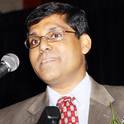While designing communication systems for sustainable smart connected communities (SCCs), energy efficiency is as important as quality of service (QoS). However, simultaneous achievement of both is difficult due to the varying demands posed by heterogeneous sensing modalities, lack of dedicated infrastructure in rural areas, and certain sustainability constraints. While low-power short range technologies often fail to achieve high QoS, using 3GPP technologies (LTE, LTE-A,GSM) for SCCs will eventually face spectrum scarcity and cross technology interference. While dynamic spectrum access (DSA) has been proposed to overcome policy constraints and improve spectrum scarcity by spectrum sharing, we show in this paper that harnessing DSA in the context of SCCs can achieve benefits in terms of end-to-end energy efficiency. This paper proposes a novel architecture for SCCs using a small scale DSA enabled overlay network over legacy infrastructure to improve the end-to-end energy efficiency while guaranteeing QoS. Specifically, our approach selectively exploits distinct electro-magnetic characteristics of various bands in order to intelligently match any message requirement with a suitable band, and hence determines the optimal TTL constrained energy-efficient (TcE) path that enhances the end-to-end energy efficiency and meets the TTL deadline. We formulate a constrained optimization problem and propose a dynamic programming approach for the determination of optimal TcE path for any given message. Compared to the homogeneous band approaches that opportunistically accesses channels within a predetermined band, our studies show that the band selection approach improves the energy efficiency by almost 40% while preserving the QoS.
- Constrained optimization,
- Dynamic programming,
- Mobile telecommunication systems,
- Quality of service,
- Spectroscopy,
- Transistor transistor logic circuits,
- Wireless telecommunication systems,
- Band selection,
- Constrained energy,
- Constrained optimization problems,
- Dynamic spectrum access,
- Dynamic spectrum accesses (DSA),
- Heterogeneous sensing,
- Magnetic characteristic,
- Simultaneous achievement,
- Energy efficiency
Available at: http://works.bepress.com/sajal-das/45/

This research is partially supported by the NSF grants CNS-1545037, CNS-1545050, and NATO grant G4936. We would like to acknowledge Rishab Singhal for his assistance with the experiments.